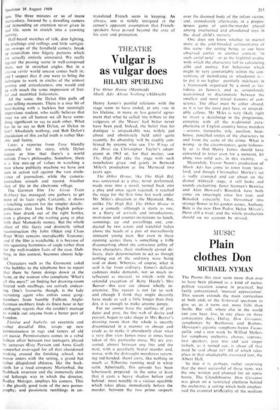THEATRE
Vulgar is as vulgar does
HILARY SPURLING
The Other House (Mermaid) Much Ado About Nothing (Aldwych) Henry James's painful relations with the stage seem to have ended, at any rate in his lifetime, in more or less general agree- ment that what he called 'my tribute to the vulgarest of the Muses' had better never have been paid. Indeed, the belief that his dialogue is unspeakable was widely put about and obstinately held until quite recently. Its absurdity will be readily con- firmed by anyone who saw The Wings of the Dove (in Christopher Taylor's adapt- ation) in 1963 or, for that matter, saw The High Bid take the stage with such nonchalant grace and gaiety in Bernard Miles's production at the Mermaid two years ago.
The Other House, like The High Bid. was conceived as a play, never performed, made over into a novel, turned back into a play and once again rejected; it reached the stage for the first time last week under Mr Miles's direction at the Mermaid. But, unlike The High Bid, The Other House is not a comedy--although it starts as one, in a flurry of arrivals and introductions, invitations and counter-invitations to lunch, summings up and parcellings out, con- ducted by two astute and watchful ladies above the heads of a pair of marvellously innocent young men. But even in these opening scenes there is something a trifle disconcerting about the conscious jollity of these characters, their studiously casual de- livery. their determination to act as though nothing out of the ordinary were being said or done. Whereas, of course, what is said is far from ordinary. James's delicate cadences make demands, not so much in- tellectual as musical. to which—with the splendid exception of Betty Hardy's Mrs Beever—this cast are almost wholly in- attentive. The reason is not far to seek and (though I think they might decently have made us seek a little longer than they do). it is enough to make anyone jumpy.
For no sooner have the outlines of pre- dator and prey. the fine web of desire and pursuit, begun to take shape in Mrs Beever's drawing room than the whole is smartly disconnected in a manner so abrupt and crude as to make it abundantly clear what a very dim view James must at times have taken of this particular muse. We are pre- sented, almost between one line and the next, with a peculiarly brutal murder and, worse, with the distraught murderess return- ing red-handed, shawl awry, like nothing so much as Tilburina running mad in white satin. Admittedly, this episode has been laboriously prepared —in the sense at least that it casts a heavy shadow before and behind: most notably in a vicious squabble which takes place, immediately before the murder, between the two prime suspects over the doomed body of the infant victim; and, immediately afterwards, in a prepos- terous game of spot-the-murder played among overturned and abandoned toys in the dead child's nursery.
One does not know whether to marvel more at the cold-blooded sentimentality of this scene--the setting being, as our hero observed earlier in another context. 'in such awful taste'—or at the frightful avidity with which the characters fall to calculating alibi and motive. For behaviour which might lit very comfortably within the con- ventions of melodrama or whodunnit is— to put it no higher-- painfully indelicate in a framework organised by a mind as fas- tidious as James's, and as scrupulously accustomed to discriminate between the smallest and most trivial tremors of con- science. The effect must he either absurd, as it is for the most part here, or unspeak- ably callous. Mr Miles is very likely right to insert a sketchmap in the programme, complete with all the traditional para- phernalia of English country house murders —arrows, footpaths, stile, pavilion, boat- house. pencilled routes of the characters to and from the scene of the crime. What is wrong— in the circumstances, quite hideous- ly so--is that Henry James should have consented to loiter even for a moment, let
alone two solid acts, in this vicinity. 4
Meanwhile. Trevor Nunn's production of Much Ado has come to town from Strat- ford, and though Christopher Morley's set is sadly cramped and cut about on the dismal Aldwych stage, it still looks and sounds enchanting. Janet Suzman's Beatrice and Alan Howard's Benedick have both come on amazingly since last year, and Benedick especially has blossomed into strange flower in his garden scenes. Anthony Bate is the new Don Pedro. Helen Mirren's Hero still a treat, and the whole production should on no account be missed.


































 Previous page
Previous page